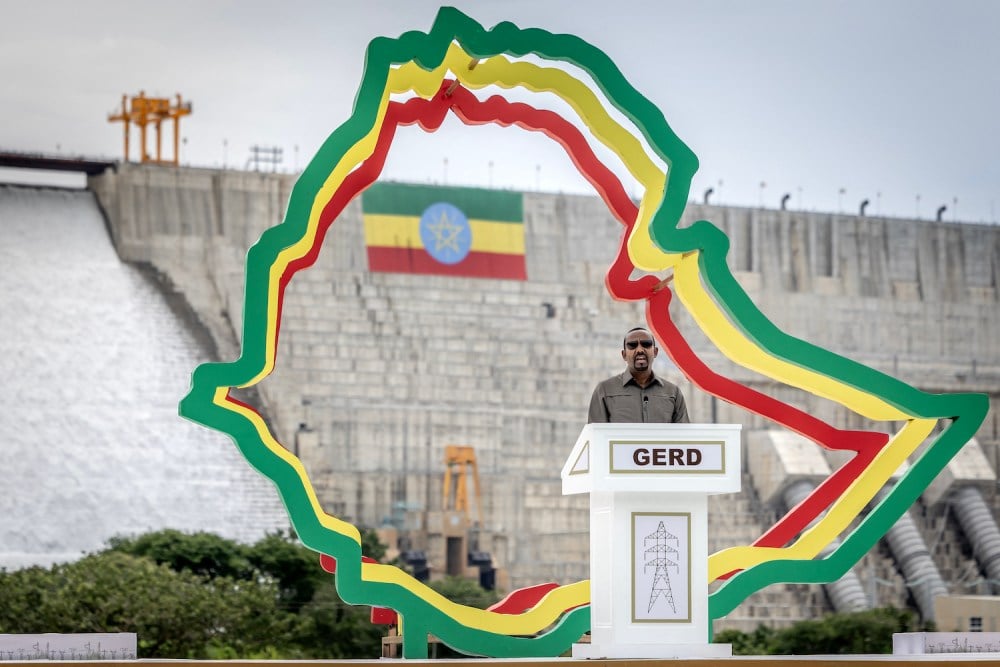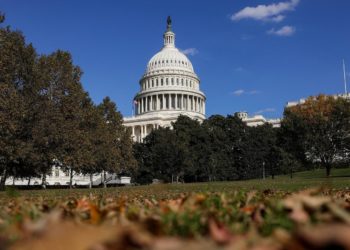Welcome to Foreign Policy’s Africa Brief.
The highlights this week: Ethiopia opens a controversial dam on the Nile River, South Sudan’s military seizes key towns amid conflict with a rival group, and Kenya’s president hires a U.S. lobbying firm to do his bidding in Washington.
Egypt Girds Itself for the GERD
Ethiopia opened Africa’s largest hydroelectric dam on Tuesday, ending Egypt’s majority control of the Nile River. The controversial $5 billion Grand Ethiopian Renaissance Dam (GERD), which took 14 years to build, aims to double Ethiopia’s power generation and increase electricity access for around 60 million Ethiopians who lack it.
Ethiopia also plans to sell cheap electricity generated by the 5,150-megawatt-capacity GERD to Kenya, Tanzania, and Djibouti, through which the Ethiopian government is aiming to create $427 million in export revenue this fiscal year. Kenyan President William Ruto attended the dam’s inauguration.
But not everyone is happy about the GERD—especially not Egypt, which relies on the Nile for around almost all of its freshwater supply. Some 80 percent of the river’s waters originate in Ethiopia, and Egypt says that the GERD threatens its water security. Cairo previously floated the idea of military intervention against Ethiopia to stop its construction.
In a letter to the United Nations Security Council on Tuesday, Egypt warned that it would take action to defend “the existential interests of its people.” Egyptian Foreign Minister Badr Abdelatty wrote that “any misconceptions that Cairo would turn a blind eye” to its interests in the Nile are “mere delusions.”
Egypt long controlled the majority of the Nile’s waters under a 1929 treaty between the United Kingdom and Egypt, then under partial British colonial rule; the treaty granted Egypt veto power on Nile construction projects, even those beyond its borders. Sudan later signed a 1959 agreement with Egypt, which increased Egypt’s share of the Nile’s flow from about 57 percent to about 66 percent.
However, upstream nations—including Rwanda, Tanzania, Uganda, and Ethiopia—had zero share of the river’s water resources and argued that they could not be bound by colonial-era agreements that excluded them. By 2024, five of these countries had signed a new treaty, which was rejected by Egypt and Sudan.
With the GERD, Ethiopia now exerts control over the Nile. Ethiopian Prime Minister Abiy Ahmed has framed the GERD as an issue of national pride. “This project means the end of Ethiopia’s geopolitical insignificance,” Abiy said this month.
“The idea that Ethiopia should be able to build a dam on its own territory … and shouldn’t be pushed around by Egypt is broadly something that most Ethiopians would get behind,” Magnus Taylor, the deputy director of the Horn of Africa project at the International Crisis Group, told Reuters.
During U.S. President Donald Trump’s first term, the United States reduced aid to Ethiopia in an attempt to torpedo the GERD’s construction. Egypt is a major U.S. ally and one of the largest recipients of U.S. foreign aid and military assistance. However, Ethiopia then used popular bonds—sold to residents and the Ethiopian diaspora—to finance the dam.
Trump waded into the dispute again in July, when he said that his administration was “working on” resolving tensions between Egypt and Ethiopia. He said in June that the dam was “stupidly” funded by the United States, a claim that Addis Ababa disputes.
“Trump held grudges against Ethiopia for not adhering to his self-styled mediation efforts between Ethiopia and Egypt eight years ago,” Fekahmed Negash, a former Ethiopian GERD negotiator, told the Reporter Magazine, an Ethiopian outlet.
Since the turn of the century, Ethiopia has relied on China for financial support. Beijing partly financed some of the infrastructure around the dam, such as power lines, through loans from the Export-Import Bank of China.
Ethiopian critics have said that Egypt’s fears about the dam’s impacts on water security are overblown and that Cairo’s anger is driven by geopolitical ambitions. Egypt’s Aswan High Dam, built on the Nile in the 1960s, irrigates farms in the country. However, Egypt argues that the process of filling the GERD has already led Sudan to experience water declines.
The dam dispute has the potential to stoke tensions throughout the Horn of Africa, where Ethiopia faces a looming conflict with Eritrea over access to the Red Sea. In 2024, Ethiopia signed a deal with the breakaway region of Somaliland for Red Sea port access. That prompted Somalia, Eritrea, and Egypt to forge what they called an “axis” of resistance against Ethiopia.
Somalia has since made peace with Ethiopia in a deal brokered by Turkey, but hostilities remain between Ethiopia and its neighbors. Last week, the Arab League released a statement arguing for the protection of the water rights of Egypt and Sudan.
The statement prompted a sharp response from Suleiman Dedefo, Ethiopia’s ambassador to Somalia. “What legal or moral ground does the ‘Arab League’ have to threaten Ethiopia on behalf of Egypt and instruct Ethiopia to apply for permission to utilize its own resources?,” he posted on X.
The Week Ahead
Wednesday, Sept. 10: Senegal releases inflation data for August.
The Intra-African Trade Fair concludes in Algiers, Algeria.
Thursday, Sept. 11: The U.N. Security Council votes on extension of its sanctions and arms embargo against Sudan.
Tuesday, Sept. 16: Malawi holds presidential elections.
What We’re Watching
South Sudan power struggle. After weeks of renewed conflict in South Sudan, the country’s military said on Saturday that it had taken control of at least two towns in the northeastern state of Upper Nile from a rival army loyal to the imprisoned vice president.
In March, a 2018 power-sharing arrangement between President Salva Kiir and Vice President Riek Machar collapsed. Kiir leads the Sudan People’s Liberation Movement (SPLM), which spearheaded South Sudan’s 2011 independence push and is linked to the Dinka ethnic group. Machar leads the SPLM-in Opposition, or SPLM-IO, which has ties to the Nuer ethnic group.
Kiir’s government arrested Machar on charges of attempting to stir a rebellion. Kiir accused the SPLM-IO and its military wing of colluding with the White Army, a Nuer-armed group that Kiir’s army has been fighting since February in the state of Upper Nile, which borders Sudan.
Sudan’s army, meanwhile, has said that Kiir is quietly backing a new alliance between an offshoot of the SPLM and the Sudanese military’s rival, the paramilitary Rapid Support Forces.
Climate finance summit. African lenders and commercial banks signed a deal to mobilize investments of up to $100 billion in financing Africa’s green industrialization, Kenyan President William Ruto said during the Africa Climate Summit in Addis Ababa this week. The institutions include the African Export-Import Bank, the African Development Bank, and Ecobank Transnational.
Africa is one of the continents most affected by extreme weather events, accounting for 85 percent of human exposure to wildfires globally. But it receives just 2 percent of global climate financing from lenders. A Climate Policy Initiative report released in June found that much climate-related financing has disappeared from dwindling foreign aid budgets.
Ruto’s U.S. lobbyists. Ruto’s administration has defended a move to sign a $175,000 per month lobbying deal with a U.S. firm amid outrage from the public and opposition parties. The Kenyan government recently signed a contract with Continental Strategy, a consulting group founded by Carlos Trujillo, Trump’s former ambassador to the Organization of American States.
Kenya is seeking closer ties with the United States on trade and security following months of protest against Ruto’s administration and a violent crackdown by Kenyan security forces. Kenyan Prime Cabinet Secretary Musalia Mudavadi said that deal was a “legitimate practice” to advance Nairobi’s interests in Washington, “where competition for visibility is intense.”
Kenya was a key African partner under former U.S. President Joe Biden but has found itself sidelined under Trump. Republican U.S. Sen. James Risch asked for a review of Biden’s designation of the country as a major non-NATO ally due to Kenya’s ties to China, Iran, and Russia, but the proposal was rejected by Congress.
Pre-UNGA visa restrictions. The Trump administration plans to grant a one-month sanctions waiver to Equatorial Guinea’s vice president, Teodoro Nguema Obiang, allowing him to attend the Africa Energy Investment Summit on the sidelines of the U.N. General Assembly meeting in New York City this month and travel around the United States freely.
Obiang is the son of President Teodoro Obiang Nguema Mbasogo, who is Africa’s longest-serving president. The United States, France, and Switzerland have prosecuted the Obiang regime on accusations of widespread corruption and state plunder, which have left citizens in poverty despite the country’s vast natural resources.
The U.S. waiver decision was made to counter China’s influence in Africa, The Associated Press reported. China signed a deal with Equatorial Guinea last year that includes financing of several infrastructure projects. Beijing also reportedly has ambitions to build a naval base in the country.
FP’s Most Read This Week
- The End of Development by Adam Tooze
- China’s Military Is Now Leading by Sam Roggeveen
- Xi’s Pablum and Power by Sergey Radchenko
What We’re Reading
Elite capture in Gabon. After leading a coup in Gabon in August 2023, President Brice Oligui Nguema promised the people of Gabon a change from the old guard—despite being the cousin of ousted President Ali Bongo. In the Republic, Bergès Mietté questions whether it is possible “to build a new Gabon with those who have been carving it for decades.”
Since being democratically elected in April, Nguema has kept some loyalists from the Bongo regime who “have been able to reconvert, without transition, into the Nguema regime, which they are working to reshape or even torpedo,” Mietté writes.
Ethiopian resistance in Somerset. In New Lines Magazine, Meena Venkataramanan revisits why Ethiopia’s last monarch, Haile Selassie, spent years in exile in the sleepy English city of Bath, better known for being the onetime home of author Jane Austen.
From Bath, where he lived between 1936 and 1940, Selassie planned a comeback against Italian occupation. He rallied British organizations for support, ultimately allowing him to defeat the army of Benito Mussolini. Selassie was instrumental to the founding of the Organization of African Unity, which was eventually succeeded by the African Union.
The post Ethiopia Debuts New Mega-Dam appeared first on Foreign Policy.




